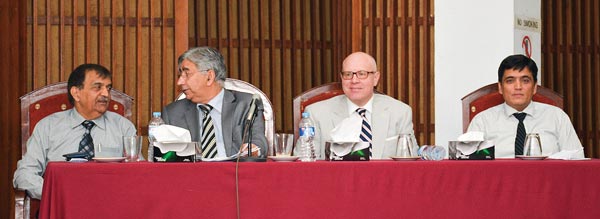The Pakistan Agricultural Research Council (PARC) and CIMMYT organized a two-day annual wheat planning meeting at the National Agricultural Research Centre (NARC) in Islamabad. The meeting was in support of the Wheat Productivity Enhancement Program (WPEP), which is funded by the U.S. Department of Agriculture (USDA). The objectives of WPEP are to improve wheat though rust surveillance, breeding, pre-breeding, seed production, agronomy and coordination and capacity building. Meeting participants focused on a review of the progress made in 2013-14, identifying emerging opportunities and developing work plans for the coming year.

“The United States has a long history of collaboration with Pakistan in the agriculture sector; WPEP has made exceptional progress in the country to develop Ug99-resistant wheat varieties which will ensure food security,” said David Williams, agricultural counselor at the U.S. Embassy in Islamabad. He also commended the integrated research efforts of national and international partners for the enhancement of the nation’s wheat yields.

Imtiaz Muhammad, CIMMYT’s country representative in Pakistan, shared the impacts of WPEP on national and international wheat research systems. He added that CIMMYT’s efforts in the seed component of WPEP are substantial. WPEP has made significant progress; the release of Ug99-resistant wheat varieties (such as NARC-2011, PAK-13 and the upcoming Borlaug-14) will improve the livelihoods of smallholder farmers in Pakistan.
WPEP has played a vital role in developing a wheat rust surveillance system, upgrading infrastructure and improving the research capacity in Pakistan. Collaborative and coordinated efforts through PARC and CIMMYT have enabled the country to develop a rust culture bank. It has built the capacity of provincial wheat breeding programs to secure wheat production against the potential threat of Ug99 races.
During the technical session, partners from across Pakistan agreed that developing Ug99-resistant wheat varieties to replace traditional varieties and making them available to farmers is a critical step in maintaining high yields in Pakistan. Participants acknowledged the support of the USDA, CIMMYT and PARC in wheat research.
 Capacity development
Capacity development